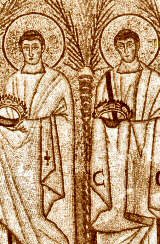
"Merciful Lord, in Your boundless love, be pleased to make us worthy to enter the path of Theosis before we leave the present temporal world"
Posted on 09/10/2014 8:30:27 PM PDT by Salvation

Feast Day: September 11
Born: 3rd century AD
Died: mid 3rd century AD, Rome
Major Shrine: San Giovanni dei Fiorentini, as well as the chapel of the Propaganda College. Both in Rome.
Blessed Louis of Thuringia
Feast Day: September 11
Born: (around) 1180 / Died: 1227
Louis was a German prince who married St. Elizabeth of Hungary when he was twenty-one and she was just fourteen. Their parents had arranged the marriage, as this was the custom.
But they both loved God, and he gave them great love for each other so that they were very happy together. Their joy increased when God gave them their three children. The youngest was Blessed Gertrude.
Louis helped his wife in her many works of charity for the poor. He also joined her in prayer each day. The people often saw their handsome prince and his lovely wife helping the poor.
Once Elizabeth brought a leper into their castle and looked after him in their bed. For a moment, when Louis saw that, he was angry. Then, suddenly, instead of the leper, he saw our crucified Lord lying there. This was proof of how much Jesus loved Elizabeth's charity. Then Louis built a big hospital for lepers.
One long, bitter cold winter, Louis was called away from his land to deal with some trouble. When he returned, Elizabeth was overjoyed. But the next year when Louis left on a Crusade to free the Holy Land from the Muslims he caught malaria on his way there, and soon was dying.
Because he had always been close to Jesus, the brave ruler was not frightened to die. He received the Last Sacraments and died peacefully in 1227.
This is an incredible reading for today, 9/11. One thing that is missed in our discussions of “love your enemy” is that Jesus is talking to people that are living. He never mentions that we have to submit and die to our enemy. Interesting point I think. Thoughts? God bless
??
Thursday, September 11
Liturgical Color: Green
The Spiritual Exercises of St. Ignatius
Loyola was published in Rome on this
day in 1548. Written by the devout saint
for retreats, the exercises are still used
by many to increase their personal piety
and discern their vocation.
What should you do if you have lied to, deceived, or betrayed someone?
Every offense against truth and justice, even if it has been forgiven, demands reparation. If one cannot make amends publicly for a lie or false testimony, one must at least do whatever one can secretly. If one cannot compensate the injured party directly for the wrong, one is obliged in conscience to give him moral satisfaction, in other words, one must do his best so as to make at least symbolic reparation.
Why does telling the truth require discretion?
Communicating truth must be done prudently within the context of charity. Often the truth is wielded as a weapon and thus has a destructive rather than a constructive effect. When conveying information, we should think of the "three sieves" of Socrates: Is it true? Is it kind? Is it helpful? Discretion is called for also in dealing with professional secrets. They should always be kept, except in special cases defined by strict criteria. Likewise, anyone who publicizes confidential communications that were made under the seal of secrecy commits a sin. Everything we say must be true, but we need not say everything that is true. (YOUCAT questions 456-457)
Dig Deeper: CCC section (2487-2489) and other references here.
Part 3: Life in Christ (1691 - 2557)
Section 2: The Ten Commandments (2052 - 2557)
Chapter 2: You Shall Love Your Neighbor as Yourself (2196 - 2557)
Article 8: The Eighth Commandment (2464 - 2513)
Jesus said to his disciples: "Love one another even as I have loved you."1 ⇡
You shall not bear false witness against your neighbor.253
It was said to the men of old, "You shall not swear falsely, but shall perform to the Lord what you have sworn."254 ⇡
III. OFFENSES AGAINST TRUTH ⇡
Every offense committed against justice and truth entails the duty of reparation, even if its author has been forgiven. When it is impossible publicly to make reparation for a wrong, it must be made secretly. If someone who has suffered harm cannot be directly compensated, he must be given moral satisfaction in the name of charity. This duty of reparation also concerns offenses against another's reputation. This reparation, moral and sometimes material, must be evaluated in terms of the extent of the damage inflicted. It obliges in conscience.
1.
253.
254.
IV. RESPECT FOR THE TRUTH ⇡
The right to the communication of the truth is not unconditional. Everyone must conform his life to the Gospel precept of fraternal love. This requires us in concrete situations to judge whether or not it is appropriate to reveal the truth to someone who asks for it.
Charity and respect for the truth should dictate the response to every request for information or communication. The good and safety of others, respect for privacy, and the common good are sufficient reasons for being silent about what ought not be known or for making use of a discreet language. The duty to avoid scandal often commands strict discretion. No one is bound to reveal the truth to someone who does not have the right to know it.283
283.
Cf. Sir 27:16; Prov 25:9-10.
Daily Readings for:September 11, 2014
(Readings on USCCB website)
Collect: O God, by whom we are redeemed and receive adoption, look graciously upon your beloved sons and daughters, that those who believe in Christ may receive true freedom and an everlasting inheritance. Through our Lord Jesus Christ, your Son, who lives and reigns with you in the unity of the Holy Spirit, one God, for ever and ever.
RECIPES
ACTIVITIES
o Elementary Parent Pedagogy: Two Homes, Heaven and Earth — Building up Family Unity and Security
o Homemade Prayer Book for Preschool Children
PRAYERS
o September Devotion: Our Lady of Sorrows
o Collect from the Feast of Sts. Protus and Hyacinth
· Ordinary Time: September 11th
· Thursday of the Twenty-Third Week of Ordinary Time
Old Calendar: Sts. Protus and Hyacinth, martyrs
According to tradition Sts. Protus and Hyacinth were Romans by birth, brothers and servants in the house of St. Basilla. They were burned alive around 257, during the persecution of Valerian and Gallian. St. Hyacinth is unique among Roman martyrs in that his epitaph and grave in the cemetery of Basilla on the Old Salarian Way were found intact in modern time (1845); in it were the charred bones of the martyr, who had been put to death by fire. Part of the empty tomb of St. Protus was also found. According to the 1962 Missal of St. John XXIII the Extraordinary Form of the Roman Rite, today is their feast.
Sts. Protus and Hyacinth
The story of most martyrs of the first three centuries is so obscured by legend that it is difficult for us to cull out the historical kernel; this is true of today's saints. Tradition tells us that the brothers Protus and Hyacinth were chamberlains to the holy virgin Eugenia (listed as a martyr on December 25 in the Roman Martyrology) and were baptized along with their patron by Bishop Helenus. They devoted themselves zealously to the study of Sacred Scripture and lived for a time with the hermits in Egypt, illustrious for humility and holiness of life. At a later date they accompanied Eugenia to Rome and were arrested by Emperor Gallienus (260-268) for their profession of the Christian faith. In no manner could they be persuaded to deny the faith or worship the gods. Accordingly, after an inhuman scourging, they were beheaded on September 11.
Veneration of the two martyrs in the Church of Rome dates to venerable antiquity. Ancient registers contain their names, Pope Damasus praises them in verse at the end of the age of martyrs. The cemetery of Basilla marked the site of their graves; relics of St. Hyacinth were discovered there in 1845 and now are honored in the chapel of the Propaganda.
Excerpted from The Church's Year of Grace, Pius Parsch
Things to Do:


These pictures go with the previous post.
23rd Week in Ordinary Time
Stop judging. (Luke 6:37)
At a conference on education in Germany, a political scientist compared that country’s education system to asking a cat, a monkey, a dog, and an elephant to climb the same tree. When they can’t, they are deemed unsuccessful. Today’s passage tells us that we do something similar when we judge people. We expect them to climb a particular tree—our tree—and do it well.
We have all made snap judgments at one point or another. “That person should … Why does she always
… If he would just …” Instead of recognizing people as unique treasures, we try to fit them into a restrictive mold based on our own personal values. When we do this, we overlook the fact that our expectations may be totally off the mark for what God wants in another person’s life. We certainly can’t think that we have all the answers. That’s God’s department, not ours!
If you find yourself prone to being judgmental, try to counter it by shifting your attention. Try your best to look at people as treasured children of God—just as you are. They might express themselves differently or choose to act in ways you don’t agree with, but guess what? We all have our own set of quirks and imperfections, and God welcomes all of us. Or try thinking about all the people who have welcomed you, despite your flaws: your parents, your spouse, your children, or a special teacher or friend. They accepted you as you are, even as some of them spurred you on and encouraged you.
Is there someone in your life right now who is rubbing you the wrong way? When negative thoughts start to spiral out of control, say a quick prayer: “Holy Spirit, help me to stop judging this person. Help me to accept him or her as you have accepted me.” You may have to say this prayer over and over, but in the process, God will slowly soften your heart. As you accept this person, you may even find a friendship forming as you learn from each other. In the end, you’ll discover that love can take you much further than judgment ever could!
“Holy Spirit, help me to stop judging. Teach me how to turn my judgments into love.”
1 Corinthians 8:1-7, 11-13; Psalm139:1-3, 13-14, 23-24
Daily Marriage Tip for September 11, 2014:
Our culture often thinks, “If it’s new, it’s better.” But sometimes the old and trusted is better. Over the years spouses develop a comfort with each other’s idiosyncrasies. What “crazy things” do you love about your spouse?
| A Most High Ideal | ||
|
||
|
September 11, 2014. Thursday of the Twenty-third Week in Ordinary Time
|
||
|
|
||
|
Luke 6: 27-38 Jesus said to his disciples: "To you who hear I say, love your enemies, do good to those who hate you, bless those who curse you, pray for those who mistreat you. To the person who strikes you on one cheek, offer the other one as well, and from the person who takes your cloak, do not withhold even your tunic. Give to everyone who asks of you, and from the one who takes what is yours do not demand it back. Do to others as you would have them do to you. For if you love those who love you, what credit is that to you? Even sinners love those who love them. And if you do good to those who do good to you, what credit is that to you? Even sinners do the same. If you lend money to those from whom you expect repayment, what credit (is) that to you? Even sinners lend to sinners, and get back the same amount. But rather, love your enemies and do good to them, and lend expecting nothing back; then your reward will be great and you will be children of the Most High, for he himself is kind to the ungrateful and the wicked. Be merciful, just as (also) your Father is merciful. "Stop judging and you will not be judged. Stop condemning and you will not be condemned. Forgive and you will be forgiven. Give and gifts will be given to you; a good measure, packed together, shaken down, and overflowing, will be poured into your lap. For the measure with which you measure will in return be measured out to you." Introductory Prayer: God the Father, thank you for the gift of creation, including my own life. God the Son, thank you for redeeming me at the price of your own Body and Blood. God the Holy Spirit, thank you for being the sweet guest of my soul, enlightening my mind, strengthening my spirit and kindling the fire of your love in my heart. Petition: Lord Jesus, help me to actively seek the perfection you desire for me. 1. Revolution or Civil War? The values that Jesus proposes in his sermon on the mountain might be termed “revolutionary.” Never had the ideal of love been placed so high, demanding such heroism in practice. That’s why what Jesus asks provokes a struggle within me, between the “old man,” who resists this message, and the ideals my Lord places before me. This might be termed a “civil war” played out on the battlefield of my heart. 2. The Golden Rule: Jesus gives me what has been termed the “Golden Rule”: do to others as you would have them do to you. Since I naturally love myself to the point of desiring all good things and nothing bad to come my way, Jesus exhorts me to transfer that benevolence to others. This requires an effort for me, since I tend towards egoism. What can lift me up out of my smallness, my narrowness? 3. Becoming like God: God’s plan for me is marvelous. It exceeds my comprehension to hear Jesus tell me to be perfect, not according to a standard of human perfection, but according to divine perfection. My vocation is to become like God – for his divine life to increase in me and for my narrow, egoistic standards to diminish and disappear. I would not strive for such a high goal, if it were not commanded by my Lord. I must trust that he can do it in me. What I have to do is to collaborate with him, seeking him in prayer and discerning his will for me always. Conversation with Christ: I thank you, Lord Jesus, for wanting to transform me into a greater likeness of God. Without you, this is impossible. With you, everything is possible, even in me with all my weaknesses and limitations. Your will be done! Resolution: I will transform my way of judging from my point of view to God’s. Today I will strive to put into practice the “Golden Rule”. By Father Patrick Butler, LC |
September 11, 2014
This is one of the hardest teachings in the bible! Love your enemies, do good to those who hate you and pray for those who treat you badly! As human beings we immediately say this is very hard to do. But as followers of Christ, we need to trust and obey him by having a total change of attitude and way of thinking and behaving when dealing with others and establishing relationships.
Our personal struggle with this teaching was challenged when we had an experience with one of our relatives who owed us a substantial amount of money from way back and had no intention of paying the debt. Although hurt, nevertheless, we forgave him and our relationship improved. Recently, this relative fell into a financial trouble again and needed money for his children’s tuition.
We were willing to help, but since he did not simplify his lifestyle even if he is in a bind, common sense seemed to dictate to us to stop helping him. But being Christians, we must not only help in material things but also and more importantly with his conversion from the old life of bad habits to a reformed one of doing God’s will. Condemnation will not change things; only love and care.
We will only be able to love our enemies if we let Jesus live in our hearts. Jesus loved us unconditionally. Nobody is perfect, us included. We need God’s grace and mercy to be humble and to do his will.
Language: English | Español
All Issues > Volume 30, Issue 5
|
||||||||||||||||||||||||||||||||||||||||

Disclaimer: Opinions posted on Free Republic are those of the individual posters and do not necessarily represent the opinion of Free Republic or its management. All materials posted herein are protected by copyright law and the exemption for fair use of copyrighted works.